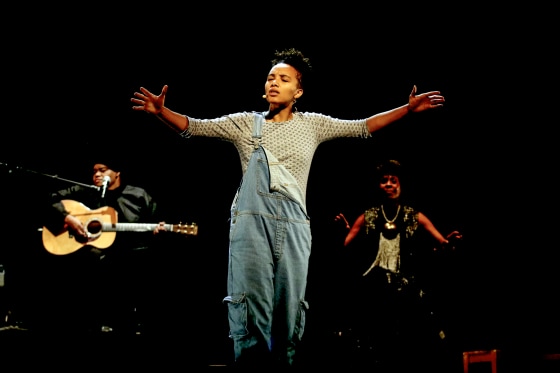Author Octavia E. Butler has challenged the boundaries of space and time. Now her work is influencing the stage.
Butler’s 1993 novel, “Parable of the Sower,” is heading to Lincoln Center in the form of an opera by the celebrated librettist Toshi Reagon, co-designed with her mother, the acclaimed musician and activist Bernice Johnson Reagon.
“Octavia E. Butler’s Parable of the Sower” will make its New York City debut on July 13.
Butler's story is set in 2024, at a time when the U.S. is descending into climate disaster-fueled chaos and the government is becoming increasingly fascist.
Toshi Reagon said that the timing of the show makes sense. “It’s really on time because it’s reflecting the reality that we’re all living in, whether you know the book or not,” she said. In the earlier days of the production's decadeslong development, Reagon said that she didn’t think we — as a country or a planet — would be anywhere near the conditions described in the book in 2024. The pandemic changed her outlook.
“I started paying attention globally,” Reagon said. “When Covid happened, I was like, this is an opportunity for us to really see our power. People have said that you can’t stop pollution. But then the world shut down and the sky was clear. We got to see our collaborative power globally. And we also got to see collaborative violence globally.”
Butler’s work started to feel more urgent and contemporary, and not just to Reagon. There is renewed interest in Butler’s writing — particularly her Parable series — in the past few years. It wasn’t predicting a difficult future anymore; it was describing a terrifying present.
“Many people feel very assaulted by their government’s impact on planet Earth,” said Reagon. That frustration, she noted, lies under the resurgence of interest in works by Butler, who died in 2006. “I think that’s the thing that turns us towards the world that Octavia imagines. People are reading her books and seeing that somebody saw this 30 years ago, which means we, in some way, have been living it. In the back of our minds, a lot of us have been worried about where we are now.” That’s why this opera, she said, is “on time.”
Still, it took decades before this opera got to this moment.
In the late '90s, author and professor Toni Morrison tapped Reagon and Johnson Reagon to teach a multidisciplinary creative writing course at Princeton University based on their work as musicians and activists. During the course of the semester, their work inspired by Butler's book began to take a musical shape, even when initially they weren’t quite sure about what exactly they were making.
“There’s a lot of a cappella groups on Princeton’s campus and my mom is an a cappella singer,” Reagon said. “It just made sense.” The class made music that explored themes of climate disaster, dislocation and community, “but it wasn’t like we were trying to do theater or anything,” she explained.
Then, in 2008, the Reagons workshopped the piece with the New York City Opera and the opera began to take on a more distinct form.
Things didn’t work out with the New York City Opera — often called “the people’s opera,” which shut down in 2013 due to financial problems — but the Reagons continued to develop the work.
“We really wanted to keep writing the libretto. We didn’t want to give up just because it didn’t work out with the New York City Opera. So we kept working on it,” Reagon said. After workshopping the opera in bits and pieces and performing the evolving iterations of the work for decades, the full opera is now heading to one of American opera’s biggest stages, Lincoln Center.
Shanta Thake, the chief artistic director at Lincoln Center, agrees that the timing is right for the full opera’s premiere. “The parable is this hour,” Thake said. “The book is a prophecy in a lot of ways and it’s set in 2024. ‘Parables’ is a warning and holds a lot of beautiful lessons.”
“Parable of the Sower,” both the original book and the opera, offer incisive lessons on how we can come together in community to make a change, Thake said.
Lauren, the main character and narrator of the story, doesn’t get to choose in advance with whom will she eventually ride out apocalyptic world events. Like the audiences that gather for the performances, togetherness happens by the fact of proximity. Lauren has to be flexible about who she builds community with and Reagon hopes that is a lesson that audiences can learn together as temporary de facto communities.
Community building is one of the themes of the story that was incorporated into the libretto and the evolving performance from the very start. Over the course of three decades, hundreds of people — perhaps thousands — have sung this work into being.
“Later on in the book, you see this beautiful parable that kindness eases change,” Reagon said. “Everything is so desperate. The rules are rigid. Life is not easy.” The kindness of strangers who end up becoming community is both a healing balm and the glue that holds people together through hard times.
Reagon wants to take the audience along for part of that journey and hopes it will take in some of the valuable lessons “Parable of the Sower” has to offer. “To really think about your community as people that you can watch out for and they could watch out for you,” Reagon said. “You don’t have to get along in some mystical magical way, but you could have the mutual respect of upholding a practice of community.”
